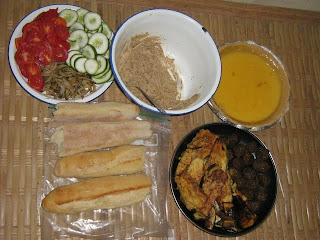We've been at site for almost a week now and so much has happened that it's difficult to choose what to write about. Over the past week, we've met (and greeted ad nauseum, of course)* countless people, some of them countless times, unpacked and decorated our house, which included three trips to the tailor to get curtains made correctly, but in the end accomplished the goal of not being able to see people walking by while getting dressed, attended two lengthy dedication ceremonies in the same day, fled from multiple konkerons**, met two different groups of foreign donors, attended a football (soccer) match that ended in police threatening to use tear gas on the crowd, rode our bikes to a nearby village and had dinner with other volunteers in the area, rode our bikes to our training village, visited with friends, and were wisked away to an impromptu late-night meeting about water access and small enterprise upon our return, and helped cook several Gambian dishes. Cooking is completely different here, so despite the fact that we consider ourselves relatively good cooks at home, we are having to start over from scratch here. It is fun, but also a bit daunting!
To give you an idea of what I'm talking about, here is a step-by-step description of cooking a traditional Gambian dish called "ebey," which we helped with yesterday:
-Evening before - Decided to cook ebey the following day and agreed to meet in the morning to cook it.
-9:45am - Arrived at our friend's compound, found she had already got cassava from somewhere and was finishing cutting it into pieces and putting it to soak in a bucket of water
-10:30am - Departed for Soma to buy the rest of the ingredients for the dish (two kinds of dried fish, two kinds of tamarind, hot peppers, palm oil, jumbo cubes (boullion with MSG and Vitamin A added))
-10:45am - Arrived in Soma in record time after hitching a ride with a man from our village with a car who was going that direction.
-11:45pm - Departed Soma with the aforementioned ingredients, plus a few other items Jacob and I wanted - vegetable oil, bananas, "donkey soap" (laundry soap), and a gallon tub of groundnut (peanut) butter (we got the tub filled for $7-8!). Despite our protests, our friend insisted on having her brother carry the heavy tub of groundnut butter back for us.
-12:45pm - Arrived back at our friend's compund after walking the whole way back and started peeling the tough skin off the cassava (peeling the chunks in our hands and cutting inward because everyone insists any other way is too dangerous - unfortunately cassava skin is too thick for our vegetable peeler to be effective).
-1:15pm - Finished peeling the cassava and ate lunch #1 while we waited for the "kitchen" (small room with a wood cookfire) to be available. Give the cassava peels to the goats. Put tamarind in a bowl of water to soak.
-1:45pm - Got wood from a room in the back of the compound, put the cassava on to boil, and pounded the peppers with a wooden mortar and pestle (you have to be careful not to pound to vigorously or you will splash hot peppers juices up in your eyes). Removed fish from the bones/skin/innards and tore into small pieces. Gave the scraps to the dog and chickens.
-2:15pm - Ate lunch #2
-2:45pm - Removed the cassava from the boiling water, pounded it in the mortar and pestle (along with the pounded peppers that were still in it), returned it to the pot to cook for another 10 minutes or so, and repeated three times.
-3:30pm - Mashed tamarind in the bowl with fingers, added jumbo cubes, then added the mixture to the cassava pot, along with the fish. Cooked for a few minutes, then added vinegar, palm oil and salt to taste. Took a bowlful out of the pot and floated it in a bucket of water to cool it slowly.
-4:00pm - Finally eat the ebey (chewing carefully and spitting out tough cassava fibers, tamarind seeds, and fish bones on the ground as we eat). Chickens descend on our rejected items.
*I'm not sure if I mentioned this before, but greeting is a very important part of Gambian culture. Whenever you see someone, even if you just saw them a few minutes ago, you are expected to run through a formulaic set of questions about the wellbeing of the person, their family, their compound, their work, etc, tailored for the time of day, and the person is expected to give predetermined answers to them. Think of a very long drawn-out version of "What's up? Not much" or "How are you? Fine thanks."
**Konkerons are a bizarre phenomenon of this culture that even the volunteers who have been here for two years have trouble explaining. Essentially they are people dressed up in large shaggy costumes that run around with machetes demanding money and threatening to beat people (and sometimes actually going through with it). They generally appear on holidays and at ceremonies and have an entourage of people beating drums and dancing. They are somewhat scary and Peace Corps advised us to avoid them wherever possible. See below:


I have some other pictures saved up as well, including pictures of our house...I will post them shortly...




















































